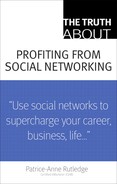Amanda is a senior recruiter for a small specialty recruiting firm focusing on senior-level marketing and sales positions. She has been a recruiter long enough to remember when “google” wasn’t a verb, or, for that matter, when web search engines didn’t yet exist. But the strong expertise she has developed in sourcing and researching candidates on the web keeps her one step ahead of her less technically savvy competitors.
Amanda thinks she has found the perfect candidate for her client, a Fortune 500 firm looking for an international marketing director. While searching for potential candidates on LinkedIn, she discovers Ben’s profile. Ben is currently an international marketing director for a competitor, has great references, and speaks fluent Spanish and Portuguese, which is critical to the emphasis on Latin markets that this position requires. Ben also indicates in his profile that he’s open to new offers. Amanda’s eager to contact Ben, but before she does so, she wants to find out a little more about him.
To start, Amanda decides to google Ben to see what she can discover about him. In most cases, Amanda either finds little of interest or finds information that bolsters Ben’s desirability, such as details on professional presentations or activities. But occasionally, she finds information that detracts.
Ben has an unusual last name, which makes the search process easier than if his name were Smith or Jones. This is critical to Amanda, who needs to be absolutely certain that she has the right person if she’s going to make a judgment call. Her first page of hits on Google brings up Ben’s LinkedIn profile and information about his presentation at an American Marketing Association meeting. So far, so good.
But Amanda digs deeper into the search results and finds a match for Ben’s name on the website of an activist group. Normally, Amanda deems a candidate’s personal, political, or religious beliefs irrelevant to a search, but the activities of this particular group concern her. She visits the website and sees Ben in a group photo. Amanda has viewed Ben’s photo on his LinkedIn profile, so she feels confident that it’s the same person. Now Amanda faces a serious dilemma. Normally, she never considers membership in a particular group as a reason to disqualify a candidate. But few people would support a group such as the one Ben belongs to, and many would be outraged at his participation. If the information became more widely known, it could prove problematic to any company that employed Ben. Amanda decides to pass on Ben and move on to other potential candidates.
Welcome to the world of digital dirt. If you’re a recruiter or hiring manager, you need to know if there’s anything in your favorite candidate’s background that would make you not want to hire that person. Although Google might be the name of one of the world’s best-known search engines, in popular English, it’s become a verb that refers to the common activity of searching for information about someone online.
According to a recent survey conducted by the recruitment firm The Creative Group, at least 50 percent of employers search for information about potential candidates online. Of these, 19 percent say that they always conduct an online search, whereas 31 percent say that they do this only sometimes. Of those surveyed, 14 percent indicate that they have made the decision not to hire based on information discovered online.
Googling candidates to dig up “digital dirt” is a way of business for many recruiters and hiring managers, but not everyone agrees with the activity. A number of privacy rights activists claim that performing Internet searches on job candidates is an invasion of privacy that could result in legal action if a candidate isn’t selected based on the results of such searches. A study conducted by the recruitment firm Manpower indicated that 56 percent of workers surveyed felt that an Internet search on their background was unethical.
Most recruiting experts, however, feel that the benefits outweigh the risks in such cases. Employers face more legal liability having to deal with the unprofessional actions of their employees than they do from the potential of candidates suing because they weren’t hired, particularly in a job market where hundreds of applicants often vie for the same position.
The moral of the story is this: Use wisely the information you uncover about candidates. By making decisions based on business judgment rather than personal opinion, you can avoid the legal liability of hiring candidates prone to inappropriate actions as well as the legal liability of not hiring candidates who claim discrimination.
